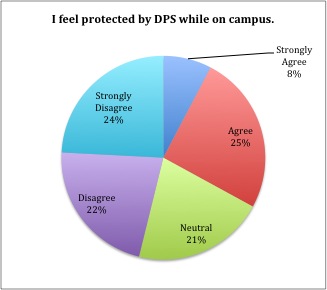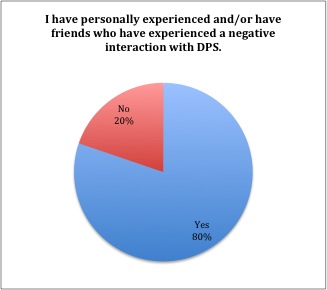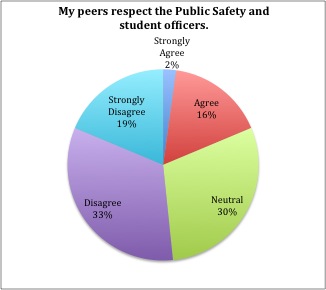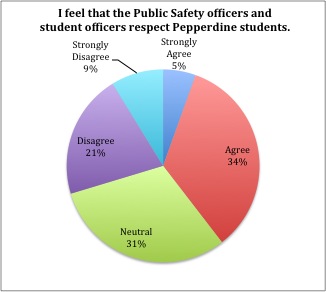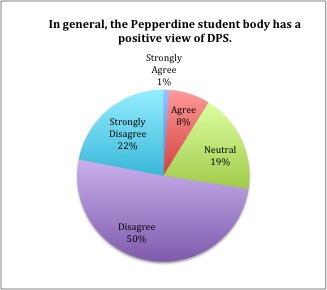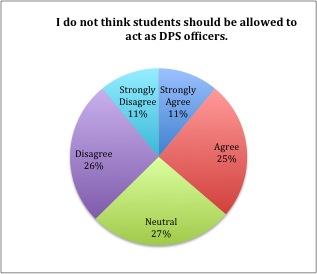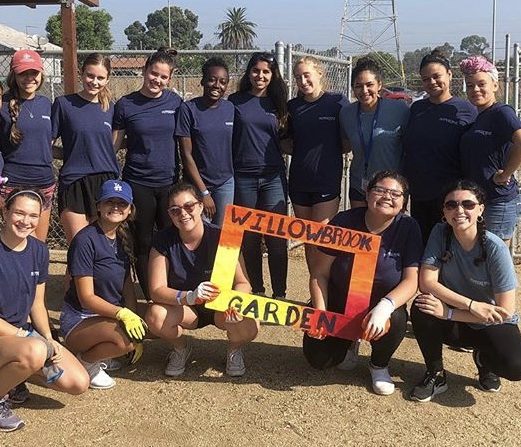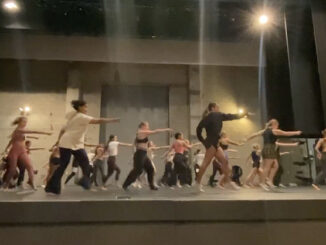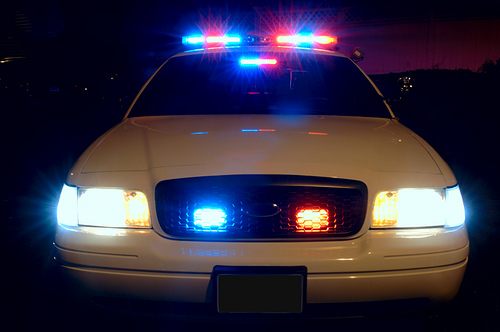
The reverberating fire alarm buzzer echoed throughout the Drescher residential complex Sept. 26, 2014 as Department of Public Safety officers went door-to-door vacating each apartment.
A routine fire drill descended into confusion and chaos.
Junior media production major Arin DeGroff, 21, and her roommate advertising major Kiah Jones, 21, were two of the many residents confused by the sounding alarm and incessant pounding on their front door.
When the two women opened the door, they said a DPS officer immediately threatened to send them to judicial for not exiting the building. While the officer may have been trying to convey the seriousness of the drill, both said the officer’s tone angered and scared them.
“When the incident occurred I felt helpless,” Jones said. “All the other officers tried to deflect from the situation. I felt that they didn’t care the officer had disrespected and terrified me.”
DeGroff and Jones are not alone in their negative perceptions of DPS. A poll of 100 students found that only about 39 percent of students believe Public Safety officers respect them. On the other hand, some 52 percent of students believe their peers don’t respect Public Safety.
The poll found that 72 percent of students surveyed had a negative view of DPS. Only 9 percent thought the student body had a positive view of DPS.
This mutual lack of respect discourages positive interaction, students said. Additionally, students said they were confused over what disciplinary actions DPS can take and what student officers are allowed to do.
DPS Deputy Director Dawn Emrich, while initially granting an interview, declined to respond to the survey results and referred requests for comment to Matthew Midura, associate vice president for Integrated Marketing and Communication. Midura never returned phone calls.
Earlier, Emrich said DPS has worked on enhancing its relationship with the student body through working events and partnering with SGA.
“SGA and DPS serve in committees together, and DPS is receptive to any concerns that SGA presents to them,” said Ima Idahosa, 20, junior psychology major and 2015-2016 SGA President. “This year we’ve partnered to improve safety through the LiveSafe app and work toward a healthier campus through the Healthy Campus 2020 nutrition initiative. Since SGA has an established relationship with DPS, we encourage students to share their concerns with us so we can address them.”
In interviews with eight Pepperdine students, six students said they think a lack of respect is currently damaging the relationship between DPS and the Pepperdine student body.
“In my experience with DPS, I felt there was a lack of respect,” DeGroff said. “I felt that even though the rules were broken in the perspective of the DPS officer, that does not mean students should be yelled at. Instead we should be talked to and treated like the fellow adults we are.”
Junior broadcast journalism major Kyle Simpson, 20, said he has never had a personal run in with DPS but said he has heard countless stories of negative interactions between DPS and students. The poll indicated roughly 80 percent of Pepperdine students have personally experienced and/or have friends who have experienced a negative interaction with DPS.
“Pepperdine is small and news travels fast,” Simpson said. “While I personally have not had a negative encounter with DPS, the stories I’ve heard since attending Pepperdine have caused me to view DPS in a negative light. When I think of DPS, I think about tickets, traffic stops and room raids. I’m pretty sure the majority of Pepperdine students think something along similar lines. In my personal opinion, in general DPS is more so hated than appreciated. It will be hard to change that.”
Junior media production major Kevin Schremp, 20, recently had a negative encounter with DPS when trying to obtain access to the Pepperdine newsroom.
“Last weekend when I requested access to the Pepperdine newsroom, I experienced the disrespectful nature of Public Safety officers firsthand,” Schremp said. “I was inconvenienced because the key I was given didn’t work, and instead of exhibiting helpfulness and understanding the officer said I could have been lying about the key and got it from a friend. All I wanted to do was upload some footage for my class. I felt disrespected and was seriously offended.”
Students often criticize the roles of student officers. Some students question whether students should be given such powerful roles of authority over fellow students.
Roughly 36 percent of students surveyed think students should be allowed to act as DPS officers. Approximately 37 percent of students think they should not and the remaining 27 percent were neutral.
The Graphic poll showed that students did not understand the differences between the roles of a Public Safety officer compared to a student officer. The students surveyed also did not understand what disciplinary actions various Public Safety officers can take, such as who can issue speeding tickets or when they can enter dorm rooms.
“Literally the only thing I know about student officers is that they can use a clicker to access lower dorm road,” said Meghan Doyle, 18, a freshman intercultural communication and Italian double major. “I don’t think it’s ever clearly communicated to students what the disciplinary actions Public Safety officers and student officers can take. I think there would be more understanding of the actions DPS takes against the student body if their limits of authority were clearly defined.”
There are plenty of student authoritarian roles at Pepperdine aside from DPS student officers like RAs, SLAs and convocation workers, Emrich said. She said it is not fair to solely be against student officers for DPS.
Emrich said the different responsibilities and duties for Public Safety and student officers are dependent on training, qualifications and experience. The training for Public Safety officers typically lasts for about two to three months. This is extensive compared to the training period for student officers, which generally lasts for about 10 days.
Emrich said most student officers spend their time working the gate or as escorts, while Public Safety officers are assigned responsibilities according to their prior professional experience. For example, certain Public Safety officers with a background in firefighting can respond as emergency medical technicians. Others who have law enforcement backgrounds can issue speeding tickets on campus. Emrich said there are currently no badges or other ways to denote these differences to Pepperdine students.
Freshman philosophy major and SGA member Megan Jordan, 19, has a few friends who work as student officers for DPS.
“Honestly I believe that the student officers are just trying to do their jobs,” Jordan said. “And while I am not against students working as DPS officers I would still like to be more well-informed on the different things they can do compared to hired Public Safety officers.”
Freshman undecided major and DPS student officer Jilani Ghafur, 19, shared his perspective as a Public Safety student officer.
“I feel that the student body in general is initially cautious when speaking to me when I’m in uniform because I represent authority, but after a conversation starts they realize I’m here to help and I’m a student just like they are or have been,” Ghafur said.
“I’ve been disrespected before but it only happens at the gate where the physical barriers of cars and windows allow people to drive off while I’m speaking or ask questions impolitely. I don’t take anything personal; people have bad days and rough lives. It’s a choice to be offended.”
All non-student Public Safety officers approached for an interview refused and referred all questions back to Emrich.
Lauren McRae completed this story in Dr. Christina Littlefield’s spring 2015 Jour 241 class.

